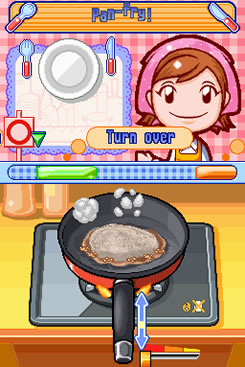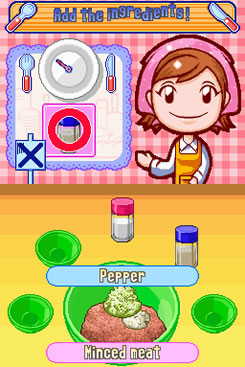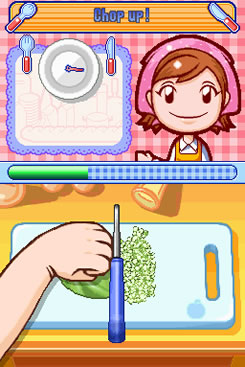There are hundreds of nuggets of wisdom that can be drawn from Bill Buford's book Heat: An Amateur's Adventures as Kitchen Slave, Line Cook, Pasta-Maker and Apprentice to a Dante-Quoting Butcher in Tuscany, one of which can be found in the following excerpt about Buford's graduation from prep cook to line cook in Mario Batali's restaurant Babbo:
"[Mario] thought for a moment. "[In a restaurant kitchen you] develop an expanded kitchen awareness. You'll discover how to use your senses. You'll find you no longer rely on what your watch says. You'll hear when something is cooked. You'll smell degrees of doneness."
"[It] seemed an unlikely prospect that this was something I could master; the kitchen remained so stubbornly incomprehensible. From the start of the day to the end, the place was frenzied. In fact, without my fully realizing it, there was an education in the frenzy, because in the frenzy there was always repetition. Over and over again, I'd pick up a smell, as a task was being completed, until finally I came to identify not only what the food was but where it was in its preparation.
"One morning ... I picked up a change in the way the lamb shanks smelled. They were browning in a large pan about ten feet away, and I walked over, trance-like, turned them, and resumed my task. My nose had told me that they were sufficiently browned and would be ruined in a minute.
It was a modest breakthrough, and I was allowed to cook."

Buford's tale of culinary education should be familiar to anyone who has ever genuinely mastered a game, those who have endlessly maneuvered through the same levels or tasks over and over again, trying to condition themselves to react when they hear a specific sound or see a flicker of movement. These are gamers who, after numerous playthroughs and hours and hours of play, are able to immediately tell when something is awry and know just when to turn the lamb shanks, so to speak.
Since you have a similar mode of learning between mastering some games and exploring the flexibility of organic ingredients, combining the two into a cooking game such as Majesco's Cooking Mama for the Nintendo DS should be a edifying experience for all involved. And in some sense, Cooking Mama succeeds at detailing the sort of learned intuition (what Batali calls kitchen awareness) necessary to cook, while simultaneously failing to create the specific environment necessary to learn cooking skills.
To be fair, Cooking Mama's primary goal isn't to teach you how to become a restaurant-class chef but, it does adhere to some culinary standards which, like it or not, preach cooking dos and don'ts. The game is centered around a warm-hearted individual named 'Mama' walking you through the steps of creating a multitude of recipes, from boiling an egg to frying a croquette, via a series of small challenges. Each recipe step is allotted a specific amount of time and, depending on how quickly and with how much precision you execute the task, Mama awards your performance a rank of 'failed', 'good' or 'very good'. Ultimately, you'll want to execute your dish with the utmost care & attention and receive a series of 'very good's and a gold medal for your accomplishment, but the fun of the game lays in discovering the challenges and pitfalls to each recipe, as opposed to just ticking each dish off the completed list.

Familiarizing yourself with the cooking skills in the game isn't difficult, despite the varied number of available gameplay techniques. There's a lot of knife-work involved, from slicing to dicing to cutting on a bias, but wielding the knife is no more complicated than using the stylus to trace lines or repeatedly tapping on the screen. You'll crack some eggs, grate some ginger, fiddle with the stove-top, stir & incorporate numerous ingredients – nothing out of the ordinary. But while the steps individually may be simple, it's how you learn to handle them that matters.
What I'm referring to is the previously mentionedawareness, learning how to execute the tasks without being prompted by an instructor shouting over your shoulder 'turn the meat now', 'blanch the greens in one minute' or 'that pasta's not al dente'. It's about discovering those techniques yourself, having solid control over your cooking skills and to steal glances at a cookbook for each step. It is the exciting trip towards a breakthrough that should, and occasionally does, make Cooking Mama fulfilling.
For example, there are a number of dishes in Cooking Mama that requires beating eggs, such as 'Crab and Egg Chinese Style'. You're handed a small bowl containing a number of egg yolks & whites and simply told to 'stir left and right inside the bowl to beat the egg. Be careful not to whip it.' When the recipe clock kicks in, there are no on-screen prompts available, except for two arrows directing left and right movement, figuratively urging you to 'stir! stir!' There's no HUD telling you how much to stir, there's no reference table telling you how quickly to stir – you simply stir until the eggs look properly beaten based on the visible air bubbles and time spent stirring, and then you stop. Miss the moment and you'll quickly realize that you've over-beaten them, followed by Mama's scornful scowl and a 'failed' placard.
While it may sound a bit unfair of Mama to refuse to hold your hand and tell you exactly when to put the beater down, her actions should be applauded. This approach forces you to rely on your visual acuity to get the job done: You have to, through repetition & observation, play until you are able to discern just how much air can be pumped into the eggs. The moment you're able to pinpoint and see exactly when you've realized the task, when you 'just know' what time to stop, you'll experience Buford's 'modest breakthrough', emotionally satisfying the way that completing any modest task is. And that's the only real way to learn about cooking food – to condition yourself to the signs telling you that the food is ready for the next step, to be able to notice the sensory signifiers shouting 'I'm ready now' and intuitively jump in to perform the next step. By not drawing an egg beating timeline for you, Cooking Mama enables that type of conditioned learning.

Sadly, for each positive cooking exercise like egg beating, there are numerous hand-holding and pandering ones such as assembling stews, which require you to follow an auto-scrolling set of instructions that tells you exactly when to add the ingredients, when to stir and when to turn down or up the heat. These are monotonous, mindless and unengaging activities as you're not given any proper feedback to actually deduce on your own when to add the ingredients, when to stir or when to toggle the heat. Sure, one could constantly read and repeat from a recipe book and prepare the same sort of dish, but you aren't learning anything by constantly using its directives as a crutch. And at least with real food in front of you you have the stimulus, the browning, the smells to figure it out independent of a text book. In Cooking Mama, visual food-based cues are rare (the bubbles in the scrambled eggs are one a few exceptions), and aural clues are non-existent.
What's worse than the hand-holding is when you're stuck with directives and goals based solely on that of the game's internal logic and not of the outside world. Nothing exemplifies this better than the 'ingredient incorporation' exercises, which pit you against an empty bowl and asks you to add several laid-out ingredients to it. The trick? You don't know the order to add them in as it's randomized each time, but you'll be penalized if you add them in the wrong order. If you find yourself unable to mix the ingredients within the allotted time, you'll simply fail the step. Each ingredient is 'unveiled' in the upper-left hand corner of the screen slowly, initially heavily pixelated but slowly comes into focus. There's little culinary explanation behind this exercise – either the order of ingredient mixing is important or it isn't – you can't have it be random and require them to be added in a specific sequence.
And that's really where Cooking Mama falls flat on its face: It often relies on inane and outright erroneous cooking steps, some which range from amateur oversights to outright ridiculousness, all of which simply undermine the effectiveness of the game. One of the more egregious offenders is a 'cool down' move concerning stove-top cooking: you're prompted to blow on the boiling contents of the pot to keep it within a favorable temperature range. Sure, it utilizes the DS microphone but have you ever expected (or even wanted) a home cook (much less a trained chef) to 'blow' on your food to cool it down? Then there are the numerous stove-top 'pressing' prompts, such as when you're pan-frying a steak. You're asked to 'press' it, to tap on the screen and squeeze the steak against the pan. While this lets out a fantastic sounding sizzle, it only serves to dry out the meat and hinders the cooking process; it's a culinary no-no. Oh, and unlike in Cooking Mama, you can't actually load as many croquettes as needed into a small fryer at once, as each one drops the oil's temperature and, if the oil temperature gets too low, the food will not fry fast enough and will result in soggy and inedible croquettes. It's also advised that you don't try and learn from one of their mixed ingredient sauté protocols, or else you'll add the garlic to the pan too early, burning it and leaving a bitter taste to the dish.
Despite these many alarming culinary oversights, when Cooking Mama isn't teaching you how to botch a recipe and when it's not having you play sing-a-long with a recipe, it can be a surprisingly fulfilling experience. The steps that require concentration, repetition and observing subtle sensory feedback instead of a relying text prompt spelling out your actions, those steps are the most satisfying and stand out. Sadly, there aren't enough of them present in the game so 'modest breakthroughs' like those that Buford experienced are few and far between. Nevertheless, if I can't be in the kitchen, I'll take a modest breakthrough every five recipes in Cooking Mama over memorizing a cookbook any day of the week.




#1 Servo Dec 18, 2006 11:41pm
If the game had been everything you had hoped for, I may have seriously considered picking it (and a DS) up. I can't cook anything, but if there were a videogame that was fun, interactive, and educational, I might just bite.
Thankfully, there are people who cook food for me.
#2 w3a2 Dec 20, 2006 07:27pm
Actually this title is almost enough reason for a pink DS for daughter.
almost.
when Super Extreme Barbie Adventures comes out consider it done.
#3 Soup Dec 22, 2006 02:59am
hold out for Mary Kate Ashley Olsen II: Descent into Darkness
#4 callista Nov 14, 2007 08:16pm
i think this game is really fun.
you should make a COOKING MAMA3
#5 Sutiin Jul 25, 2008 05:04am
LOl i love this game but the egg beating is pissing me off because,idk how to beat an egg .. and whenevr i spin it it keeps having wierd bubbles come up and then i try to spin it slower and still i NG!